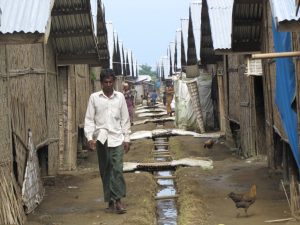Myanmar’s military junta is using administrative measures such as identity documents to facilitate a “genocide by attrition” against the beleaguered Rohingya communities of Rakhine State, a human rights group said yesterday.
In a new report, the advocacy group Fortify Rights says that the Myanmar state’s treatment of the Rohingya mirrors that of the Holocaust and the Rwandan genocide of 1994. While armed armed attacks on Rohingya communities have largely come to an end, “a genocide by attrition has long been underway and it continues today,” according to a press statement accompanying the report’s release.
The report, which was based on interviews with 23 Rohingya in Myanmar, Bangladesh, and among
the diaspora, defines “genocide by attrition” as “the gradual destruction of a protected group by reducing their strength through sustained, indirect methods of destruction.”
While the Rohingya have been subject to decades of discrimination at the hands of the Myanmar state, the campaign escalated dramatically in 2017, when the military launched fierce offensives in northern Rakhine State, driving more than 745,000 Rohingya over the border into Bangladesh.
Meanwhile, some 125,000 Rohingya who remain in Rakhine State are confined to 20 internment centers that Fortify Rights likened to “modern concentration camps.” Many observers, including the U.S. government and the United Nations human rights experts, have argued that Myanmar’s treatment of the Rohingya amounts to genocide.
While the Rohingya crisis has been eclipsed by the broader conflict that has engulfed Myanmar since the military coup of February 2021, “other forms of structural violence in Myanmar continue to occur largely under the radar,” Fortify Rights states.
The report focuses on military authorities’ use of identity documents to facilitate the Rohingya genocide, which it says reflects tactics used in the Holocaust and Rwandan genocide. In particular, it describes how the junta continues to force Rohingya to obtain National Verification Cards (NVCs) that effectively strip Rohingya of access to full citizenship rights and protections.
NVCs, the use of which dates back to the military-backed administration of President Thein Sein in the early 2010s, do this by foreclosing self-identified Rohingya from identifying as such, and by forcing them into taking on the identity of “Bengali” immigrants who have no place in Myanmar’s national community. A string of Myanmar governments, including the Aung San Suu Kyi-led National League for Democracy (NLD) administration that was overthrown in last year’s coup, have viewed the term “Rohingya” as an essentially “fake” ethnic label, describing the communities as illegal “sneak-ins” (koewin) from Bangladesh.
Rohingya refugees told researchers that the junta is “continuing the authorities’ earlier practices of refusing to allow them to identify as ‘Rohingya’ in the application process, and instead requiring them to register as ‘Bengali’ or another foreign identity,” according to the report.
The report quoted a 19-year-old Rohingya man from Minbya Township in Rakhine State as saying that “They want to make us illegal immigrants and Bengali people as a strategy to exclude us from citizenship and ethnicity [in Myanmar]. Accepting [an] NVC means you identify yourself as a ‘Bengali immigrant.’”
The Fortify Rights report also documented how the military administration has manipulated administrative categories and documentation in order to “restrict their movement and block livelihoods, creating conditions of life designed to be destructive.” It focuses on the use of Form-4” – a temporary travel permit that is required for Rohingya in Rakhine State to travel between townships or, occasionally, outside of the state.
Fortify Rights claims that the manipulation of identity documents is consistent with past genocides, particularly the Holocaust and Rwandan genocide, in which perpetrators “used identification documents to discriminate, dehumanize, and then carry out mass violence against protected groups.”
“Like past genocides,” the report concludes, “the pernicious use of identity documentation played a role in the genocide [of the Rohingya] and must be addressed to prevent future crimes.”
The report is another welcome reminder that while the sufferings of the Rohingya, both those in Bangladeshi refugee camps and those remaining in Rakhine State, has largely been occluded by the nationwide political struggle now underway in Myanmar, the problem never went away – and continues to echo past episodes of violence.

































